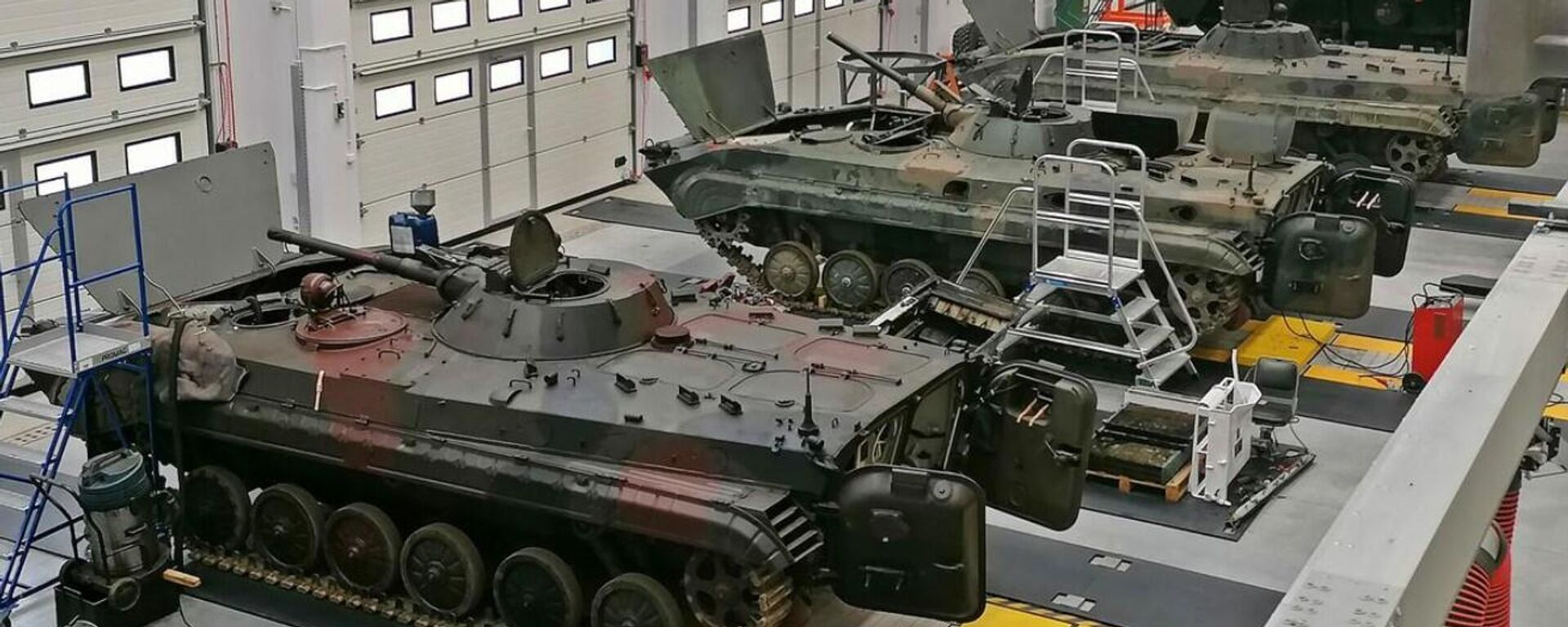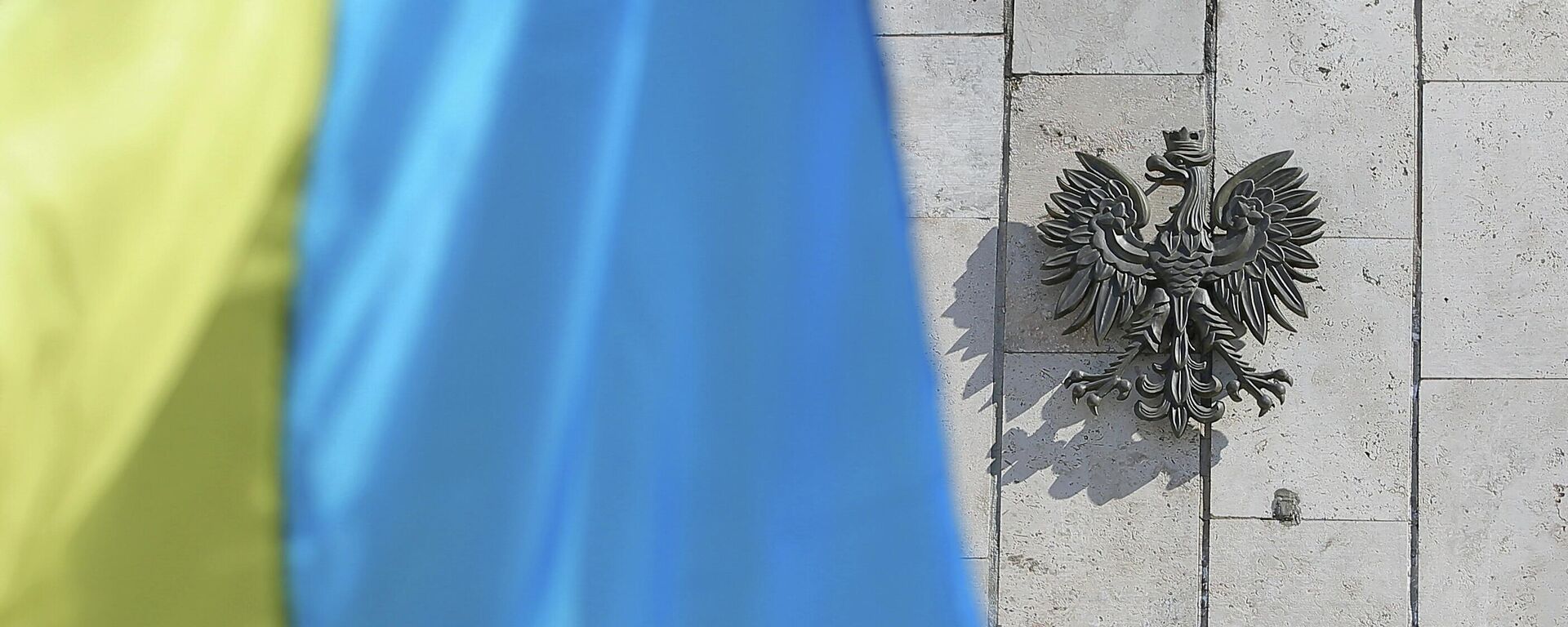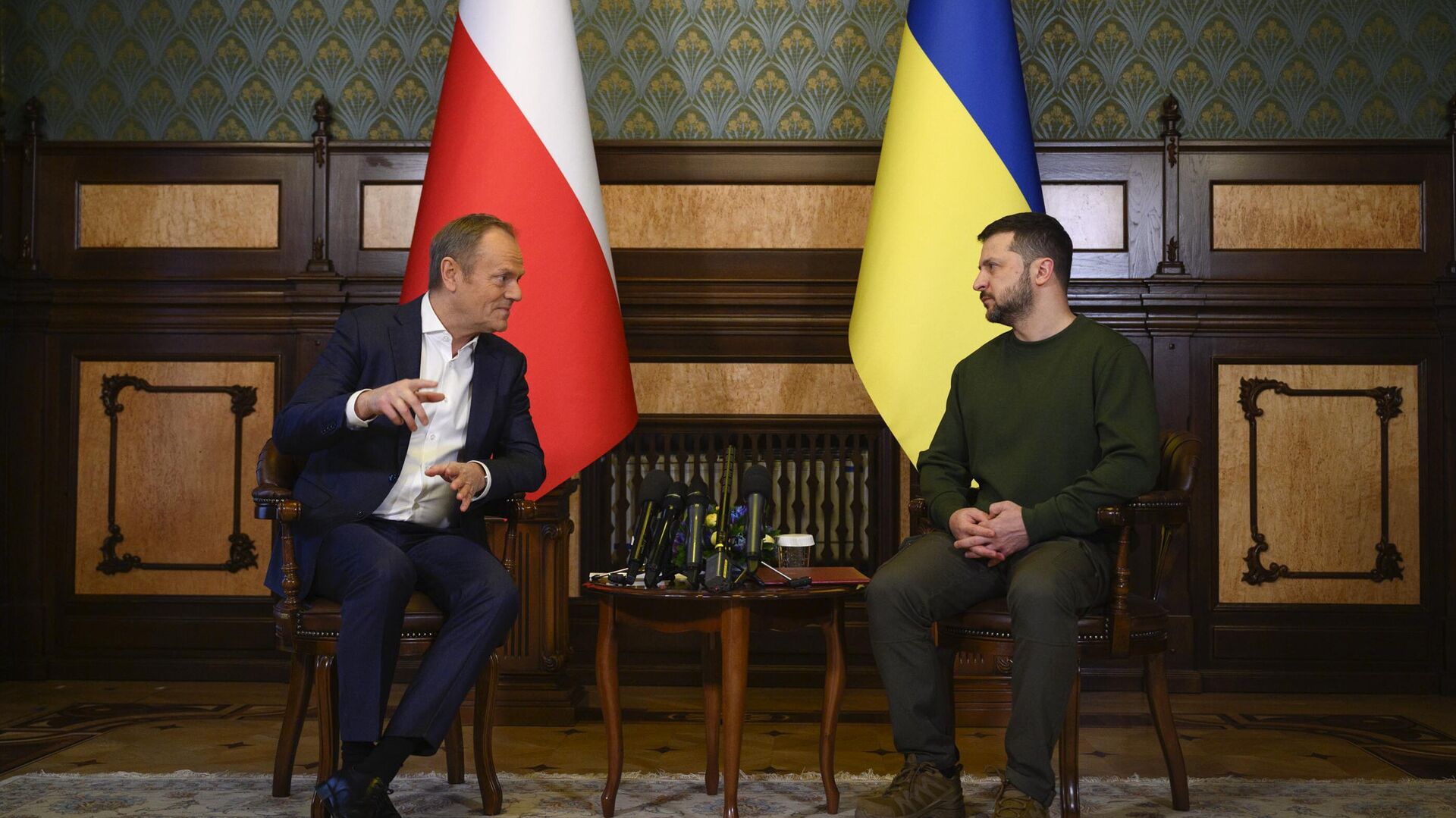https://sputnikglobe.com/20240124/polands-pragmatic-commercial-stance-on-ukraine-aid-signals-end-to-free-handouts-1116346353.html
Poland's 'Pragmatic' Commercial Stance on Ukraine Aid Signals End to Free Handouts
Poland's 'Pragmatic' Commercial Stance on Ukraine Aid Signals End to Free Handouts
Sputnik International
Polish Prime Minister Donald Tusk is advocating a more pragmatic approach to supporting Ukraine, showing free handouts to Kiev are ending, political observer Mateusz Piskorski told Sputnik.
2024-01-24T07:09+0000
2024-01-24T07:09+0000
2024-01-24T07:09+0000
analysis
poland
ukraine
donald tusk
volodymyr zelensky
https://cdn1.img.sputnikglobe.com/img/07e8/01/18/1116345232_0:146:2795:1718_1920x0_80_0_0_cfc35f17277eb69ab51cf98017da45e7.jpg
Polish Prime Minister Donald Tusk appears to be advocating a more pragmatic approach to supporting Ukraine, Mateusz Piskorski, political observer and columnist for the Mysl Polska (Polish Thought) newspaper, told Sputnik.When Tusk recently said that his country’s military assistance to Ukraine would now be on a commercial basis, unlike the case with his predecessor, he was referring to the development of the Polish military-industrial complex, the observer said.He added that it is quite possible that this will remain on paper.When Donald Tusk mentioned certain commercial opportunities that Poland would now be pursing while aiding Ukraine, perhaps what was meant was that the Polish government will turn to other countries to provide certain loans to the Ukrainian side, the analyst suggested. “In that case, the Ukrainian side can buy and order weapons from Poland on a commercial basis,” he noted.Plans by Poland and Ukraine to explore opportunities for joint arms production, with Tusk mentioning negotiations on common investments in the production of weapons, were assessed as “unrealistic” by Mateusz Piskorski. While Poland does not have any special potential in the field of defense industry, in the case of Ukraine this is even more so, as per the columnist. He stressed that the Kiev regime’s defense industry has been almost completely destroyed by Russian precision strikes as part of its special military operation. "I think that this is a purely virtual statement that has no real basis," the pundit said.At the same time, Donald Tusk’s statement about a “commercial approach” to propping up Ukraine is a signal to Kiev’s Western patrons that free support at any cost is ending, Mateusz Piskorski believed.Polish Prime Minister Donald Tusk, who returned to power in December after his stint as president of the European Council, revealed earlier that Ukraine would no longer be getting any free weapons from his country."We have come to a mutual understanding on financing. It will no longer be gratuitous aid, because it is clear that certain opportunities have reached their end," Donald Tusk said during his visit to Kiev at a joint press conference following talks with Ukrainian President Volodymyr Zelensky. A video of the presser was posted on Zelensky’s Telegram channel.From now on, the regime in Kiev would be provided with military assistance on a commercial basis, Tusk clarified."Poland is ready to support Ukraine with equipment; we will further look for joint financing and use different commercial opportunities," he added. In turn, Volodymyr Zelensky said that Poland would grant Ukraine a loan for purchasing more weapons.Deputy Foreign Minister Andrzej Szejna also appeared to indicate there would be a new phase of his country’s “defense cooperation” with Ukraine. He underscored impending commercial transfers of military equipment from Poland and dwelt on a "a collaborative approach" to arming Kiev in an interview with RMF FM. "Assertiveness means discussing that we can clearly, firmly refuse on some issues," Szejna added.It should be recalled that last September, then-Polish Prime Minister Mateusz Morawiecki said that Warsaw was no longer supplying Kiev with any weapons. Later, however, Morawiecki's remarks were clarified by the then-Polish government spokesman, Piotr Muller, who said that Warsaw was only supplying Ukraine with weapons that had been previously agreed upon. After these statements by the Polish side, Ukrainian Defense Minister Rustem Umerov confirmed that Ukraine was continuing to receive weapons from Poland. At the time, Mateusz Piskorski told Sputnik that Poland cannot be considered an “independent actor” in this matter, and that “all decisions regarding future cooperation with Kiev” will only be made with the approval of “Western partners, primarily Washington and London.”Now, amid rapidly dwindling support for bankrolling infighting- and corruption-mired Ukraine, floundering after its botched counteroffensive, other EU countries could follow the example of Poland and opt to transfer arms supplies to Kiev on a commercial basis, Piskorski suggested.Ukraine has received almost $3.5 billion in military aid from Poland since February 2022, Ukrainian Prime Minister Denys Shmygal said on Monday. "Poland provided Ukraine with weapons and equipment worth almost $3.5 billion," Shmygal said during a meeting with Donald Tusk in Kiev, as quoted by the RBC-Ukraine news agency.Shmygal clarified that Warsaw sent to Kiev hundreds of tanks, aircraft, helicopters, air defense systems, anti-aircraft missile systems, infantry fighting vehicles and armored personnel carriers, anti-tank weapons and ammunition.Ties between the two neighbors and allies soured in spring after unfettered access of duty-free Ukrainian food exports to the Polish market prompted Warsaw to ban some imports. Polish truckers have been blocking the border to protest permit exemptions for their Ukrainian competitors. When taking over the post of PM, Donald Tusk promised that he would protect Polish national interests despite commitments to support Ukraine in NATO's proxy war with Russia."I want to say that Poland's full commitment to Ukraine … cannot mean a lack of cordial assertiveness when it comes to Polish interests, the interests of Polish entrepreneurs, farmers, and truckers," he said in parliament while presenting his government’s program.Western countries, including member states of the European Union, have been providing military and financial aid to Kiev since the start of Russia's special military operation in Ukraine in February 2022. The Kremlin has consistently warned against continued arms deliveries to Kiev, saying it would lead to further escalation of the conflict. In April 2022, Russia sent a diplomatic note to all NATO countries on the issue of arms supplies to Ukraine. Russian Foreign Minister Sergey Lavrov has warned that any cargo containing weapons for Ukraine would become a legitimate target for Russian strikes.
https://sputnikglobe.com/20240123/ukraine-receives-almost-35bln-in-military-aid-from-poland-since-february-2022-1116324175.html
https://sputnikglobe.com/20231016/polands-ukraine-policy-set-by-senior-partners-in-us-eu-1114236673.html
poland
ukraine
Sputnik International
feedback@sputniknews.com
+74956456601
MIA „Rossiya Segodnya“
2024
News
en_EN
Sputnik International
feedback@sputniknews.com
+74956456601
MIA „Rossiya Segodnya“
Sputnik International
feedback@sputniknews.com
+74956456601
MIA „Rossiya Segodnya“
poland ukraine relations, poland government coalition, military aid, military aid from poland, ukrainian prime minister denys shmyhal, ukrainian president volodymyr zelensky, poland's prime minister donald tusk
poland ukraine relations, poland government coalition, military aid, military aid from poland, ukrainian prime minister denys shmyhal, ukrainian president volodymyr zelensky, poland's prime minister donald tusk
Poland's 'Pragmatic' Commercial Stance on Ukraine Aid Signals End to Free Handouts
Ukraine will not be receiving any free military aid from Poland, Prime Minister Donald Tusk stated during his visit to Kiev recently. He added that the sides had reached a “mutual understanding” on financing, and touted a new, commercial approach to aiding Kiev.
Polish Prime Minister Donald Tusk appears to be advocating a more
pragmatic approach to
supporting Ukraine,
Mateusz Piskorski, political observer and columnist for the Mysl Polska (Polish Thought) newspaper, told
Sputnik.
When Tusk recently said that his country’s military assistance to Ukraine would now be on a commercial basis, unlike the case with his predecessor, he was referring to the development of the Polish military-industrial complex, the observer said.
"No further details have yet been provided, but when the Ukrainian side declares that they are counting on credit to buy weapons, as far as I understand, Warsaw is currently unable to provide any preferential loans to Kiev, even for the purchase of weapons produced in Poland," said Piskorski.
He added that it is quite possible that this will remain on paper.
When Donald Tusk mentioned certain commercial opportunities that Poland would now be pursing while aiding Ukraine, perhaps what was meant was that the Polish government will turn to other countries to provide certain loans to the Ukrainian side, the analyst suggested. “In that case, the Ukrainian side can buy and order weapons from Poland on a commercial basis,” he noted.
“It is difficult to say what these arrangements will be due to the fact that at the moment it is unclear how the main donors of Ukraine, such as the United States, will continue to offer their support,” the observer added.
Plans by Poland and Ukraine to explore opportunities for
joint arms production, with Tusk mentioning negotiations on common investments in the production of weapons, were assessed as “
unrealistic” by
Mateusz Piskorski. While Poland does not have any special potential in the field of defense industry, in the case of Ukraine this is even more so, as per the columnist. He stressed that the Kiev regime’s defense industry has been almost completely destroyed by Russian precision strikes as part of its
special military operation.
"I think that this is a purely virtual statement that has no real basis," the pundit said.
At the same time, Donald Tusk’s statement about a “commercial approach” to propping up Ukraine is a signal to Kiev’s Western patrons that free support at any cost is ending, Mateusz Piskorski believed.
“Even countries such as Poland, which, one might say, played a leading role in the supply of weapons and other types of assistance, are no longer able to provide it free of charge,” he added.

23 January 2024, 04:28 GMT
Polish Prime Minister Donald Tusk, who
returned to power in December after his stint as president of the European Council, revealed earlier that Ukraine would no longer be getting any free weapons from his country.
"We have come to a mutual understanding on financing. It will no longer be gratuitous aid, because it is clear that certain opportunities have reached their end," Donald Tusk said during his visit to Kiev at a joint press conference following talks with Ukrainian President Volodymyr Zelensky. A video of the presser was posted on Zelensky’s Telegram channel.
From now on, the regime in Kiev would be
provided with military assistance on a commercial basis, Tusk clarified.
"Poland is ready to support Ukraine with equipment; we will further look for joint financing and use different commercial opportunities," he added. In turn, Volodymyr Zelensky said that Poland would grant Ukraine a loan for purchasing more weapons.
Deputy Foreign Minister Andrzej Szejna also appeared to indicate there would be a new phase of his country’s “defense cooperation” with Ukraine. He underscored impending commercial transfers of military equipment from Poland and dwelt on a "a collaborative approach" to arming Kiev in an interview with RMF FM. "Assertiveness means discussing that we can clearly, firmly refuse on some issues," Szejna added.
It should be recalled that last September, then-Polish Prime Minister Mateusz Morawiecki said that Warsaw was no longer supplying Kiev with any weapons. Later, however, Morawiecki's remarks were clarified by the then-Polish government spokesman, Piotr Muller, who said that Warsaw was only supplying Ukraine with weapons that had been previously agreed upon. After these statements by the Polish side, Ukrainian Defense Minister Rustem Umerov confirmed that Ukraine was continuing to receive weapons from Poland.
Following a no-confidence vote by the Sejm, Mateusz Morawiecki's government left office, and the new Cabinet along with Prime Minister Donald Tusk were sworn into office mid-December. At the time, Poland’s incoming PM, Donald Tusk, promised that he would protect national interests despite commitments to support Ukraine in its conflict with Russia.
At the time, Mateusz Piskorski
told Sputnik that Poland cannot be considered an
“independent actor” in this matter, and that
“all decisions regarding future cooperation with Kiev” will only be made with the approval of
“Western partners, primarily Washington and London.”Now, amid rapidly dwindling support for bankrolling infighting- and corruption-mired Ukraine, floundering after its
botched counteroffensive, other EU countries could follow the example of Poland and opt to transfer arms supplies to Kiev on a commercial basis, Piskorski suggested.
“I think most Central European countries are for sure. As for Germany, we also learned that the Bundestag is refusing to send Ukraine some types of weapons, such as the Taurus cruise missiles… So, in fact, the statements that we are hearing now in Europe about the need to develop European defense capabilities are, in fact, a refusal to further support Kiev under the pretext that ‘we need to develop our own European military potential,’” the analyst said.
Ukraine has received almost $3.5 billion in military aid from Poland since February 2022, Ukrainian Prime Minister Denys Shmygal said on Monday. "Poland provided Ukraine with weapons and equipment worth almost $3.5 billion," Shmygal said during a meeting with Donald Tusk in Kiev, as quoted by the RBC-Ukraine news agency.
Shmygal clarified that
Warsaw sent to Kiev hundreds of tanks, aircraft, helicopters, air defense systems, anti-aircraft missile systems, infantry fighting vehicles and armored personnel carriers, anti-tank weapons and ammunition.
Ties between the two neighbors and allies soured in spring after unfettered access of duty-free Ukrainian food exports to the Polish market prompted Warsaw to ban some imports.
Polish truckers have been blocking the border to protest permit exemptions for their Ukrainian competitors. When taking over the post of PM, Donald Tusk promised that he would protect Polish national interests despite commitments to support Ukraine in
NATO's proxy war with Russia.
"I want to say that Poland's full commitment to Ukraine … cannot mean a lack of cordial assertiveness when it comes to Polish interests, the interests of Polish entrepreneurs, farmers, and truckers," he said in parliament while presenting his government’s program.

16 October 2023, 19:13 GMT
Western countries, including member states of the European Union, have been providing military and financial aid to Kiev since the start of Russia's special military operation in Ukraine in February 2022. The Kremlin has consistently warned against continued arms deliveries to Kiev, saying it would lead to further escalation of the conflict. In April 2022, Russia sent a diplomatic note to all NATO countries on the issue of arms supplies to Ukraine. Russian Foreign Minister Sergey Lavrov has warned that any cargo containing weapons for Ukraine would become a legitimate target for Russian strikes.




